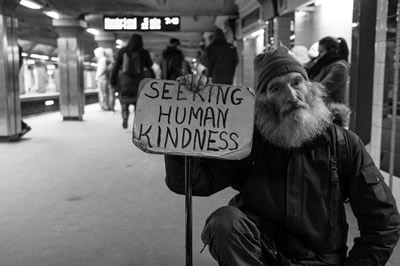Purpose Larger than the Self
I was struck by a quote I read recently. “The highest form of knowledge, according to George Eliot, is empathy, for it requires us to suspend our egos and live in another’s world. It requires profound, purpose‐larger‐than‐the‐self kind of understanding.” (Bill Bullard). In a country where we seem to constantly debate – Coke vs. Pepsi, blue vs. red, us vs. them – we rarely take time to consider what it is to live in another’s world. We live in our little bubbles (even before the pandemic made bubbles a necessity), often quite comfortable that our view of the world is the only one that’s valid. We cannot always see beyond our own realities to understand, appreciate, and validate other people’s experiences with empathy, kindness, and compassion.
What exactly is empathy? This definition comes from Greater Good Magazine. “Contemporary researchers often differentiate between two types of empathy: ‘Affective empathy’ refers to the sensations and feelings we get in response to others’ emotions; this can include mirroring what that person is feeling, or just feeling stressed when we detect another’s fear or anxiety. ‘Cognitive empathy,’ sometimes called ‘perspective taking,’ refers to our ability to identify and understand other people’s emotions …. Having empathy doesn’t necessarily mean we’ll want to help someone in need, though it’s often a vital first step toward compassionate action.” So, why practice empathy? “[It] is a building block of morality … and has far-reaching importance,” including the fact that when “group norms encourage empathy, people are more likely to be empathic—and more altruistic.” Read more about the benefits.

I’ve previously mentioned my work with the Pierce County Community Engagement Task Force Speakers’ Bureau. I am delighted to share that a speaker I trained gave his talk for the first time to a group of 15 people (and left many in tears). Marvin spoke about how typical his life was – being a class clown but liking school, getting scholarship offers from colleges – until two seminal events. His older brother (and role model) was jailed and not long after, his mother died. He went into a tailspin of drugs, prison, and self-hatred. For years he lived on the streets, but he found a way out because eventually he connected with counselors who listened and were moved to help. (He’s now in school, working, and 18 months clean.) Marvin challenged us all to do better for each other. “People who are homeless aren’t just throwaways. Look at us, see how we’re moving; help if you can. I mean, sometimes we’d see stray dogs being treated better than us.” His willingness to be vulnerable and candid, elicited empathy – and offers of help — from those who heard his presentation. Marvin was proud to be able to tell his story … and that people cared enough to listen.
At Soul Seeds, we are currently putting programs in place to help us better understand what it is to live in another’s world and to respond accordingly. I’ll have more details next month about how we’re moving forward in this work. If we are to live in a more just and more compassionate world, we must begin to see one another as individuals – all with different life experiences but with the beautiful common threads of feelings, promise, and the capacity for love.
This spring, as the days become longer, invite more light into your heart and express it at every opportunity. Find joy in sharing a kind word or gesture. Believe that we have more in common than what separates us and act from that place of positive consciousness. As Stevie Wonder so touchingly wrote and sang, love’s in need of love today so let’s cultivate empathy, kindness, generosity, and compassion – all to give some loving attention to acts of love!

Melanie Davis-Jones (she/her/hers)
Executive Director
In Case You Missed It:
Why Can’t I Find My True Love? | Blog and Video by Nancy Rebecca
Resources:
Charter for Compassion: “The principle of compassion lies at the heart of all religious, ethical and spiritual traditions, calling us always to treat all others as we wish to be treated ourselves.”
April is Sexual Assault Awareness Month – Why Talk About It?
The Rape, Abuse, & Incest National Network (RAINN), organizes the National Sexual Assault Telephone Hotline, a referral service to local rape crisis centers. Call the Hotline at 1-800-656-4673 or access RAINN’s online chat service.
Leave a Reply